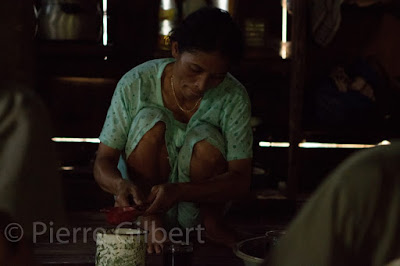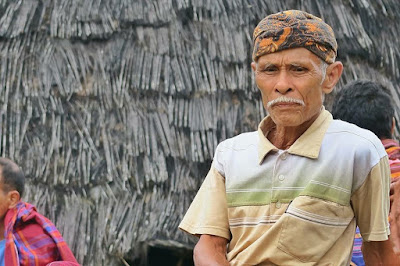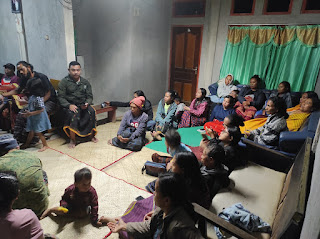Celebrating Penti
All the villagers went to light candles to their relative’s graves to invite all the spirits to get involved in the ceremony. I and my relatives went to our grandparents’ graves in order to invite the spirits to be together in “Penti” celebration. Bapa Riska who led the ritual at the cemetery had on his hands betel and cigarettes made from palm flower and tobacco that rolled together. It is believed that those are what our ancestor used to consume and smoke when they were still alive. It can be true because this habit is still seen in the current generation of Wakos people.
 |
| Bapa Riska (right) preparing cigarettes served at the graves |
After all villagers did rituals at
their graves, they were getting prepared for the main event. Adults had their
towels on their shoulders and went to a spring for taking baths. Children
shouting when the very cold water hit their bodies and women with their babies
gathered to wait for their turn.
When the day was getting dark, the
chief of the village and representatives of 9 clans in Wakos gathered around the
pile of stone as they called “Naga Beo” that means “Dragon of the
village”. According to Bapa Aloysius Hagul who is an elder of the village “Naga Beo is the guardian of the
village. We need to serve him so that he always guards the village from any
danger like natural disaster, disease, and crop failure” and regarding to
“Penti”, they invited “Naga Beo” to get involved in the ceremony. Betel,
cigarettes, and egg were put on the surface of the rock for offerings.
 |
| "Naga Beo" |
After doing the ritual at “Naga
Beo”, they continued to walk to “Mbaru Gendang” which is the main house of the
village where the chief or “Tu’a Golo” and his family are living.
For people in Wakos “Mbaru Gendang”
is not only a place for ceremonial gathering but also it is a place where they
discuss anything related to the importance of the whole people in the village
including if there is any case towards the villagers, “Mbaru Gendang” also
functions as court where conflicts between villager are solved. Those are the few first things they did before the main
event of “Penti”.
Penti
 People started to come to gather in
“Mbaru Gendang” from all 9 chiefs and representatives of the clan in Wakos.
They looked so gorgeous with their beautiful sarongs and traditional hats.
People started to come to gather in
“Mbaru Gendang” from all 9 chiefs and representatives of the clan in Wakos.
They looked so gorgeous with their beautiful sarongs and traditional hats.
According to one of the elders in
Wakos who is usually trusted to perform the ritual, Bapa Eri, "Penti"
is a thanksgiving ceremony that is always performed after "Cekeng".
"Cekeng" is typical for rice harvest during May-June. Another term
for harvest is "Kelang" that harvest occurs between October and
November. Like most places in the highlands of Flores, rice harvest only takes
twice a year, between May to June and October to November.
He also explained that, “before
“Penti”, all of the villagers are not allowed to eat new harvested rice, they
have to wait till “Penti” celebration and that ritual has to be started from
the main house and afterwards it continues to every families of the village who
own rice field around Wakos”.
In “Mbaru Gendang”, the chief has
passed away and had to be replaced by his son. However, because of still young
and less experience, he was replaced by Bapa Eri. The young chief with a bottle
of arak on his hands delivered “bo tu’ung aku tu’a landing ali manga kin ata
tu’a one mai aku, aku kali serah one ite, ho kole tuak kudu aku tulis ite
baca,” means “it is true that I am the new chief of the village but because
there is still somebody much older than me, with this bottle of arak here I
give you my words, I write and you read it.
They began to do the ritual by
giving offerings to all spirits of the village by scarifying chicken as the
main food coupled with arak, a distilled alcoholic drink. In this ritual, they prayed to
their spirits to thank them for their guards to the rice they had harvested and
hoped the new rice they eat will give healthy and prosperity to the whole
villagers.

After prayer, they took the
blood of the chicken and mixed with the rice put in front of the spokesperson. There
was a moment when Bapa Eri opened up the belly of the chicken to read the
result of the prayer out of the intestine. He said at the end “di’a” which
means all is well. People who noticed this were feeling so happy and continued
drinking their arak. After being baked, they took steaming rice mixed with
small pieces of meat from chicken and offered to the spirits.
Bapa Eri continued his ritual
by serving the meals to their spirits. Family members who live in “Mbaru
Gendang” ate the remaining of that new rice as they had been waiting for so
long for it. From mom to all children and daughter in law looked so happy to
eat the new rice. Since then, they were allowed to eat the rice they had harvested.
To show their happiness, the
family has prepared meals to serve to all of the visitors. They all ate new
rice, steaming cassava leaves mixed with pork and they had two different
glasses in front of them for water and arak.
Offerings from Every Family
When the ceremony at “Mbaru Gendang”
has finished, all the chiefs and representatives of clan went back to their
main clan’s house to do their own rituals so that all the families are required
to eat new rice.
In Wakos, there live 9 clans
and here are the names by the quantity: Clan Riwu, Lui, Mendang, Koit, Congkar,
Pembe, Bulung, Waling, and Manus.
Bapa Riska’s house was the place
where our clan Lui was gathering. His house was chosen because his father was
the eldest and the first chief of clan Lui. The current chief of clan Lui is
Donatus Sagur who at that time was leading the meeting.
For us who only met very rarely with relatives,
“Penti” is not only ritual but also seen as a moment of gathering and
reunions. We shared a lot about how we live within families, stories, and
plans. Just right before the ritual the chief led the meeting to inform us that
there would be 7 houses of clan that we were going to visit for “Penti” and he
warned that everyone must participate every single rituals till it’s finished.
The chief also talked about the
plan of the clan that has to be done in future. For clan Lui, there are three
main things to be carried out this year: renovating the cemetery of
grandparents, finish dowries for one family member, and support a family who
wants to send their child to university.
When the meeting was over, the chief
trusted one of his brothers Aloysius Hagul to do the ritual. By holding a
chicken on his hands and arak in front him, he began to worship to express his
feeling of grateful from harvest and hoped that the more will come. He also
proved his prayer by showing to people the result of the prayer out of
intestine of chicken that all is well.
 |
| Aloysius Hagul (left) and Donatus Sagur (right) |
The family of Bapa Riska hosted
everyone the best they have with new rice, pork, chicken, fish, and vegetable
made from heart of banana. Mama Riska who was behind all of this could not hide
her feeling of happiness and shared it to all of us.
 |
| Mama Riska cooking for the guests (photo by Pierre Gilbert) |
Singing Manggaraian old songs
loudly was big part of our togetherness. We went down a street and walked while
singing to the next house of the clan to continue the rituals. The rituals
apparently looked the same from one house to another, they all did offerings to
the spirits to express their happiness and hope. All of the hosts served us
meals and people looked still hunger to show their respects.
 |
| members of clan Lui |
Because of that, I and all my
relatives got involved in all the rituals till the next day. Something that I
felt how much customs have been very well-preserved among this community.
Holidays are meant to be rewarding but a trip to this small village can be a
life-changing.



Komentar